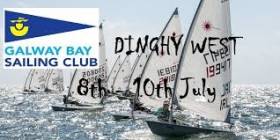Displaying items by tag: dinghy west
West Is Best For Dinghies at Galway Bay Sailing Club
Dinghy West, scheduled for Galway Bay Sailing Club on the weekend of 8th to 10th July, is steadily gathering momentum with a sizable fleet expected. Alan Donnelly, GBSC Rear Commodore for Dinghy Racing, has put a very good programme together on the dedicated website dinghywest.com, where you can get all the details…..and pay your entry too.
My word, how technology has changed. Not long ago, you might be told give a fiver on the day and a couple of beers for the committee boat. But now, race management has become such a professional service in clubs with a very high standard of on-water safety, excellent courses, and almost instant printed results at the touch of a button, that the old ways are no longer viable.
Leading Galway's race management is David Vinnell, the club's newly appointed National Race Officer, who is signed up for a number of events including the Laser Nationals in August. Club Commodore Gary Allen is committed to having a dinghy championship that will be capable of attracting all levels and classes combining the event with the Feva and Topaz regional championships, as well as all dinghies on a PY handicap.
The event is supported by the ISA Try Sailing programme and western director Pierce Purcell has secured the ISA dinghy fleet to make boats available for kids who might not own a boat to encourage extra participation.
There is also the possibility of having team entries from clubs in the event.
Galway Bay now has young clubs in Spiddal, Kinvara, Galway City and Kilronan on the Aran Islands, while beyond Slyne Head, Inishbofin is also in on the act. To attract the beginners who have not yet travelled to an event, the club will have prizes so these adults and kids can compete on the Sunday only.
The Drascombe Association under Jack O Keefe have been invited to participate with Dinghy West for a dinghy cruise from Oranmore to Kinvara and back . This event will support the notion that sailing is growing again, and is not all about racing says Pierce, who promotes cruising as Vice Commodore of the Cruising Association of Ireland.
With a number of successful Try Sailing events and courses under GBSC's belt this season, membership has grown by twenty per cent, which augurs well for the West. It sounds like a great dinghy weekend, so get on and book, or get on the blower if you prefer to Gary Allen at 086 8501457





























































